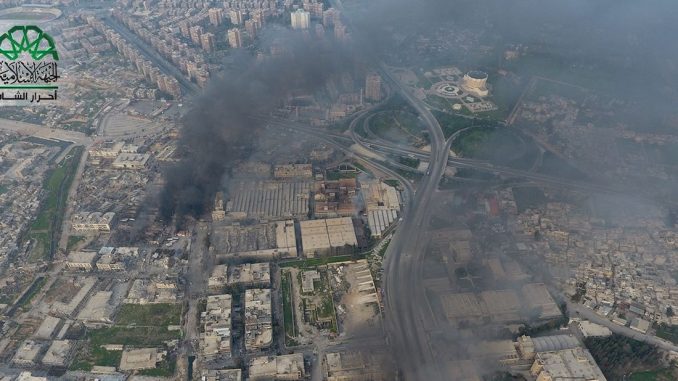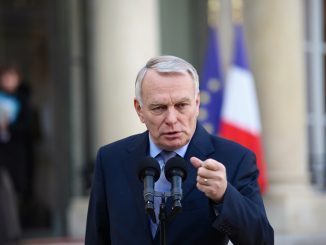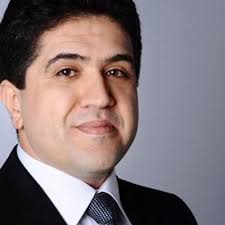
Syrian rebels renewed their attack on a regime-held area in Damascus for the second time in three days, sources on both sides said, in the first large-scale operation be the rebels in Syria’s capital in four years.
A surprise attack by rebel alliance on March 19. on the Assad regime position in Syria’s capital of Damascus led to heavy clashes and rocket shelling, which were described as the most fierce in years.
The escalation, reported by witnesses, state TV, rebel sources, and a monitoring group, marked a bid by the rebels to relieve army pressure on besieged areas they control to the east of the capital.
Moderate Free Syrian Army (FSA) and militants from Fatah al-Sham group were both involved in the assault on the districts of Jobar and Abbasid Square area, some 2 km (1.2 miles) east of the Old City walls.
The attack began early on Sunday “with two car bombs and several suicide attackers” on the Jobar district, said Rami Abdel Rahman, head of the Syrian Observatory for Human Rights monitoring group.
Rebels then advanced into the nearby Abbasid Square area, seizing several buildings and firing a barrage of rockets into multiple Damascus neighborhoods, Abdel Rahman said.
Control of Jobar – which has been a battleground district for more than two years – is one of the goals of the attack. It is divided between rebels and allied hardline fighters on one side, and government forces on the other. It is one of three pockets in the Syrian capital still in opposition hands.
Though the attack was largely repelled by Assad regime and its allied forces, the rebels proved that they are still able to conduct attacks even after the high losses they suffered after the Russian intervention.
In addition, they said that this attack won’t be the last and they are preparing for new wide offensive soon, and started a new one already on March 21.
The new offensive
The spokesman for one of the main insurgent groups involved in the attack said new offensive began at 5.00 a.m., targeting an area rebel fighters had seized from government control on Sunday before being forced to retreat.
“We launched the new offensive and we restored all the points we withdrew from on Monday. We have fire control over the Abbasid garages and began storming it,” Wael Alwan, spokesman of rebel group Failaq al-Rahman, told Reuters.
Failaq al-Rahman rebels are fighting alongside fighters from the Free Syrian Army (FSA) and a hardline al-Qaeda-linked alliance called Tahrir al-Sham.
A Syrian military source said that rebel fighters had entered the area, setting off a car bomb at the start of the attack. The source said a group of rebels that had entered the area had been encircled and were “being dealt with”.
The rebel groups have launched the assault from their Eastern Ghouta stronghold to the east of the capital. Government forces have escalated military operations against Eastern Ghouta in recent weeks, seeking to tighten a siege on the area. The rebel assault aims partly to relieve that pressure.
The fighting has focused around the Abbasid square area of the northeastern Jobar district, some 2 km east of the Old City walls, at a major road junction leading into the capital.
A witness in the Tijara residential area near the fighting said dozens of tanks were deployed – an unusual scene for residents of inner Damascus, whose quarters been spared the widespread fighting on the fringes of the sprawling city.
اللحظات الأولى لإقتحام #دمشق – #فيلق_الرحمن – معركة #ياعباد_الله_اثبتوا https://t.co/J4U2Twk1XFhttps://t.co/rvo2xEihwr pic.twitter.com/RmT5pc4MW6
— فيلق الرحمن (@AlrahmanCorps) March 21, 2017
#AhrarAlSham#Damascus#photo
Aerial photos of the liberated Industrial Area between Al-Qaboon and Jouber neighborhoods pic.twitter.com/brJpWRzWwb— Ahrar Al-Sham inter (@ahrar_alsham_en) March 21, 2017
A message to Russia
Wael Alwan, spokesman for the Free Syrian Army (FSA) rebel group Failaq al-Rahman, said: “We launched the new offensive and we restored all the points we withdrew from on Monday.”
He said the attack strengthened the hand of the mainstream opposition ahead of new peace talks in Geneva on Thursday. “Our gains today will give strength to our presence in Geneva after tomorrow,” he added.
Another rebel official heading to Geneva said the attack showed the limitations of Russia’s extensive military support.
“This is a military and political message to Russia that the regime is weak and has no full control and is unable to decisively tilt the balance in its favor militarily,” Issam al Rayess, a spokesman for the FSA’s Southern Front alliance of rebel groups.
The Syrian military source said: “They entered a narrow pocket – the same area of the (previous) breach – and now this group is being dealt with.”
A rebel commander said the Syrian army was intensifying its shelling on areas where they had advanced in Jobar and towns across Eastern Ghouta. “There is no place that has not been hit,” said Abu Abdo a field commander from Failaq al-Rahman brigade.
Clashes on Sunday and Monday killed at least 72 people, including 38 government soldiers and 34 rebels, according to the Observatory.
The Observatory added that at least 143 air raids were conducted by the Syrian army on rebel-held eastern parts of Damascus, mostly targeting Jobar, since the rebels launched their offensive.
لحظات تاريخية في دمشق ضمن معركة #يا_عباد_الله_اثبتوا
* الفيديو بواسطة المكتب الاعلامي لفيلق الرحمنhttps://t.co/XcR0ukbqiP pic.twitter.com/7aHSPmhNvG— شبكة الثورة السورية (@RevolutionSyria) March 21, 2017
#AhrarAlSham#Damascus#Video
A tour inside the Spinning and Textile Factory in the Industrial Area after kicking Assad's militias out pic.twitter.com/z1i5LXXZw1— Ahrar Al-Sham inter (@ahrar_alsham_en) March 21, 2017
“The rebels are still strong”
For rebels, however, their first such large-scale foray in over four years inside the capital signaled they were still able to wage offensive actions despite their string of defeats.
“This battle gave hope we can stand up to the regime’s military machine … It was again us going back to a sort of balance of force and not just defending ourselves,” Alwan said.
The army and its affiliated militias have been targeting the besieged Eastern Ghouta area, the biggest remaining rebel bastion around the capital, for months, making incremental gains.
It has undertaken a relentless bombing campaign of residential areas to force rebels to surrender and agree to deals that push them out of these areas, or what the regime calls “reconciliation agreements.”
Assad has described these agreements as the only form possible of the political solution in Syria, as the rebels and the original inhabitants of the area are forced to leave to northern Syria, while the regime and its allied Shiite militias take control of what they call “liberated land.”
It seems that the message the rebels want to deliver in this offensive is that they refuse these agreements and want to prevent Assad regime from controlling a bigger area around the capital, keeping pressure cards in the opposition’s hands after losing many important strongholds in Homs and Aleppo.
@SyrCoalition :
Battles Continue to Rage in Eastern #Damascus as #Assad Regime Forces Suffer Heavy Losseshttps://t.co/sei9BEePXX #Syria pic.twitter.com/DwsurqffeS— Alinaghi Amiry (@AlinaghiAmiry) March 22, 2017
An analyst said the timing of the rebel offensive was significant, marking six years since the start of the Syrian uprising.
“I think it really was in the calculus of the rebels that they want to make it known that they are still going to resist the regime, that they are still going to fight, despite the very heavy losses that they have experienced,” he said.
He added that rebel fighters used car bombs, suicide bombs, and tunnels in their assault.
“We understand that some of these [rebel] fighters have been able to launch mortar shells inside the city itself.”
Joshua Landis, an expert on Syria at the University of Oklahoma, said on Monday that the rebel offensive had taken the government by surprise and that a significant response was inevitable.
“The regime is going to realise that it cannot allow these two areas to linger there because they are beachheads for this Tahrir al-Sham group to make inroads into the Damascus area,” he said, adding the government would likely withdraw some forces from areas such as Homs and Hama to refocus on Damascus.
“It means that the fight is still on, there are many fronts to this war, and the opposition remains powerful.”
#AhrarAlSham#Watch the ongoing clashes between the rebels & Assad's militias in Jouber & Al-Qaboon neighborhoods in the #capital #Damascus pic.twitter.com/r2yLjtfO6C
— Ahrar Al-Sham inter (@ahrar_alsham_en) March 20, 2017
The Syrian crisis began as a peaceful demonstration against the injustice in Syria. Assad regime used to fire power and violence against the civilians and led to armed resistance. 450.000 Syrians lost their lives in the past five years according to UN estimates, and more than 12 million have lost their homes.



